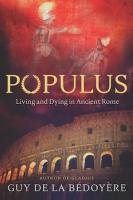
Abacus (2024) h/b 469pp £25 (ISBN 9781408716687)
B.’s introduction begins with a quotation from Pliny the Elder: ‘In my opinion, nothing is more satisfying than that people should always want to know what sort of a person a man had been’. Admittedly the quotation in context refers to the Romans’ love of filling their libraries with the busts of famous authors—it really means ‘What people looked like’—but B.’s point is that, as his title indicates, this book is about the activities of and incidents involving Roman people, named wherever possible.
The opening chapter gives a broad sense of the cityscape of Rome—the individuals featuring here are largely emperors—and also say something about e,g. its praetorian guard, finances and aqueducts. Chapter 2 deals with the Roman mindset and features its rural values, notions of family honour, appreciation of its past heroes and sense of its destiny, its demoralising enthusiasm for extravagance and how the republic turned into the empire (oddly, there is little about the powerful Roman sense of relationships controlled by reciprocity—the duty of the mutual giving and receiving of benefits). Chapter 3 turns to domus and familia, describe the importance of the family, the role of women and grandparents within it, but deals also with dysfunctional families, unfeeling treatment of women and the typical Roman residence as exemplified in Pompeian houses and apartment blocks in Ostia. Named individuals come into their own in the lengthy discussion of sex and passion in chapter 4, as too in the cursus honorum of chapter 5 and the collapse of the Republic in chapter 6.
By now ‘Populus’ seems to have largely meant the elite, but here the emphasis of the book changes. Chapters 7 and 8 deal with slaves and freedmen, Chapter 9 with dining out and eating in both for the elite and for the starving (especially poets: no change there). Chapter 10 turns to the subject of doctors and disease. Chapter 11 elucidates the popularity of the baths, chapter 12 the spectacles of Rome (the races, theatre and gladiators), chapter 13 the animals of Rome—working animals, dogs, race horses, and allegorical animal tales (mostly taken from Aesop)—chapter 14 the gods, shrines and omens and chapter 15 the Roman life span, sense of the afterlife, condolences, funerals and monuments (here B. might have mentioned the statistical work suggesting that 1/3 of babies born in any year would not last a year, and half would not reach the age of five, and the implications this had for marriage and the stability of Roman society). The book ends with a brief Epilogue. There are two blocks of excellent colour photographs.
The book’s great strength lies in its coverage of a vast range of individuals whose lives one would never touch in general books about Roman history (here he is to be congratulated on the tedious but essential task of referencing all his sources). B. does not hesitate to face the downsides of Roman society—its inequalities and brutalities—as well as its remarkable achievements. If there is a weakness, it is that the wood can sometimes not be seen for the trees. In the chapter on religion, for example, one would never guess that worship was dominated by concern for the regular succession of the seasons; again, the long list of examples of individuals’ religious concerns is simply that: a list. That can result in a lack of narrative drive.
The book closes with a number of very helpful appendices: key dates of Roman history, the emperors and the later empire, a note on the structure of Roman society, a note on inscriptions and the sources (with brief biographies of those who provide them), suggestions for visiting Italy, a glossary of terms, the source-references for his information, abbreviations, bibliography, suggestions for further reading, acknowledgements, list of illustrations and a full index.
All this makes the book very good value.
Finally, the pedant notes that, in the charming acknowledgement to his wife, perigimus should surely be peregimus; and (p. 202) cinaede should be cinaedae.
Peter Jones
